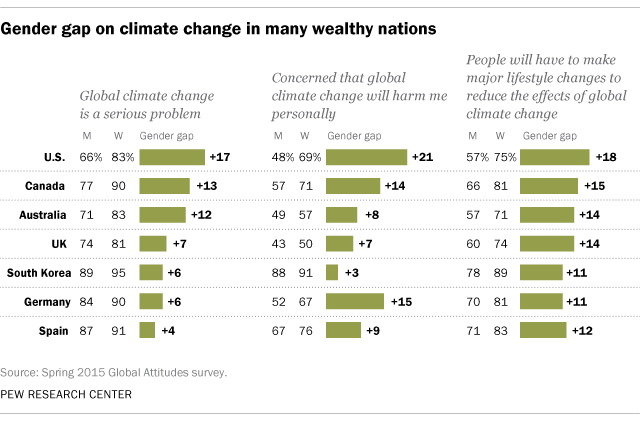Around the world, men and women express similar levels of concern about climate change. But when it comes to people who live in wealthier nations, a gender gap emerges.
In seven of 11 developed nations we surveyed this spring – from the U.S. and Canada to Germany and South Korea – women are more likely to consider climate change a serious problem, be concerned it will harm them personally and say that major lifestyle changes are needed to solve the problem.

For example, when asked how serious a problem climate change is, women in the U.S. are significantly more likely than American men (by a margin of 17 percentage points) to say it’s a somewhat or very serious problem. Canadian and Australian women’s concern also outweighs that of men in their respective countries, by 13 points and 12 points, respectively.
The gender disparity also occurs in views of personal harm caused by climate change. American women again differ the most from their male counterparts – 69% of women are concerned it will harm them personally, while fewer than half of men (48%) express this view. Women are more concerned than men in many of the other countries surveyed, including double-digit gender imbalances in Germany (+15 points) and Canada (+14).
On trusting technology alone to solve climate change versus changing personal habits, American, Canadian, British and Australian women in particular are more likely than men to think that people will have to make major lifestyle changes to reduce climate change’s effects. Double-digit differences on this question also appear in Spain, South Korea and Germany.
In some countries, the politics of climate change could in part explain the gender divide. For example, in the U.S., a higher share of women (52%) than men (44%) tends to lean Democratic. And by roughly three-to-one, supporters of the Democratic Party are more likely than Republicans to consider global climate change a very serious problem.
In Canada and Germany, we found a similar pattern, where women who support more center to center-left parties show greater concern about climate change (except in Germany on the question of making major lifestyle changes) than followers of center-right parties.
But in other nations, such as the UK and South Korea, there aren’t significant differences among women by party, and in Australia and Spain, the sample sizes are too small to analyze.